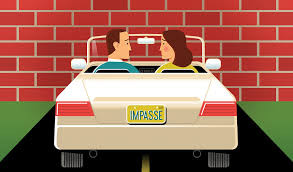Jay is a friend. He’s been married to Jia for the past 25 years. They have two beautiful school-going children. Jia’s mother has few underlying health issues, so she lives with them as well. Jay is a caring father, a loving husband, and a compassionate son-in-law. He is a good man in every sense of the word.
About a week ago, Jay’s brother, who lives four hours away, extended an invitation to spend a weekend on a golf retreat. These brothers usually meet about three times a year and all they do is play golf.
The plan sounded great, except that this time it was different. Jay’s brother, within the past few weeks, had tested positive for COVID-19. Fortunately, he’d recuperated and had tested negative at the time when Jay was invited.
Meanwhile, Jia was a little nervous about this invitation and wanted him not to go. She was concerned that he was visiting a home that was already infected and she feared he could potentially, somehow, contract the virus, even though it sounded rationally safe at the point. Notably, she feared for her mother who has underlying health issues and could be the victim if this hell broke loose.
Jay called me and asked if he should go putt those balls, or in contrast, listen to his wife and avoid potential suffering for his family by staying put at home. I pondered about the impasse and realized this wasn’t about golf or mother-in-law, to begin with. His challenge was way deeper than what was presented prima facie. There was a moral choice that had to be made and he would have to make that without the benefit of a past experience. This was a place where he would have to tread along blindfolded with absolutely no contour or cane.
Incidentally, this isn’t an isolated happenstance.
We also have found ourselves, where Jay finds himself in this narrative, oftentimes totally torn between two or more glaring choices with no reference point to hinge on.
There are ideas, and they often meet at the crossroads. Only one gets to linearly move on toward the logical space in the future and has a life of its own while the others are left behind. When this happens, we bequeath our approval to just one course that caters either to our reasons or to our feelings.
How Jean-Paul Sartre sees this state of affairs in ‘Existentialism is a Humanism’ is explained in a story of a young man who finds torn between going to England to join the Free French Forces to defeat the Germans or staying near his old mother and helping her live the rest of her life in peace. He realizes his mother lives only for him and that his disappearance or his death would give her sadness since there’s no one else in her life. On the other hand, joining the French Forces would give him a sense of purpose where he could contribute for the greater good by defeating the Nazis, while in the passing, he could also deliver retribution for his brother’s death.
Sartre thinks of such a moment, where choosing dwindles, reason relapses and action stops cold midway, as the moment where human predicament thrives the most. What could help this young lad choose? Which of those two choices is the more useful aim in the absence of omniscience? Let’s delve a little.
Max Horkheimer in his ‘Eclipse of Reason’ argues how human reason is replete with untenable undergirds and is there only to regulate our preferences and our relationships with other human beings and nature. ‘Reason’ as an organ for perceiving and determining the guiding principles of our lives has come to be regarded as outdated. In other words, reason for our choice has become synonymous with metaphysics, and metaphysics with mythology and superstition.
Our reasons, our values, what they deliver to us are uncertainties because they upsurge in randomness depending on what pool of thoughts and heuristics are available at that moment of such deliverance.
Finally, this brings us down to the other resort, our last one.
Perhaps, ‘reason’ isn’t what we should cater to then. It’s not a tool sufficiently endowed to tell us how we ought to reason our way into an unknown realm. Instead, maybe we should move forward with our instinctual feelings. Something that makes us feel good, self-righteous, and where the heart eventually finds its peace.
Among many others, Yuval Harari explains this phenomenon in “Homo Deus’ as humanism.
In the absence of an external paradigm that can assign meanings to our undertakings, we have begun to selfishly consult ourselves about how we feel about what we do. Thusly, what feels good is good, and what feels bad is bad. And if an action does not cause anyone to feel bad, there’s nothing wrong with it. That which thrills us gets blessed and that which does not gets cursed. In ethics, the humanist motto is if it feels good do it. In aesthetics, humanism says that beauty is in the eye of the beholder and human feelings are the ultimate source of all meanings and authority.
Coming back to Jay, I do not know which way the choice will take him.
All I can see is how helplessly crippled he is within his human limits.
He could either reason himself into staying home and potentially mitigate the sufferings for his family or he could intuit his way to that golf course and putt away some balls and feel fulfilled about his undertakings. That choice is for him to make.
For me though, a moment like this would go remiss if I didn’t invoke what Ludwig Wittgenstein wanted all to know toward the end of Tractatus. And I (mis)quote him “Whereof one cannot choose, thereof one must hang on.”
Unfortunately for Jay, hanging on isn’t a choice.

